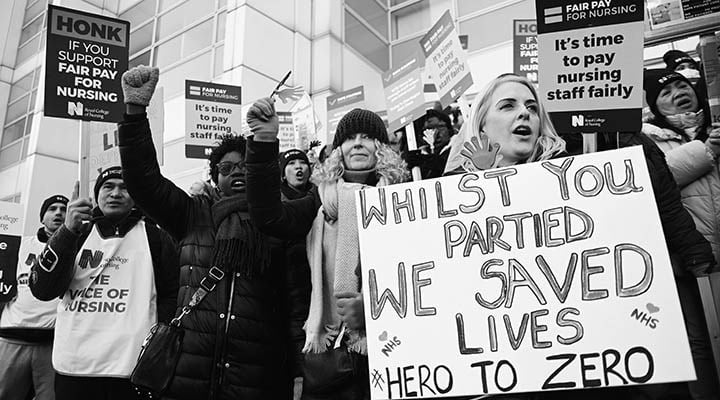Paul Mason's interview with BirGün: Are we seeing the return of effective trade unionism?
Europe wakes up to more industrial action every day. Does it solely stem form wages and conditions? Or are there other factors at play? As BirGün, we asked one of the UK's most prominent journalists, Paul Mason for his comments.

Çevrim ÇEVİREN
France, Britain, Spain, Germany… Europe has been shaken by strikes for some time now. But especially since the start of the year, more workers seem to be using industrial action to help lift the cost of living pressure that the pandemic has left upon them. Or did it? Are there more fundamental issues to blame? What’s really happening in Europe? BirGün asked prominent UK journalist Paul Mason for his views.
Paul, thank you for accepting this interview. The UK experienced nurse strikes in December 2022, alongside other strikes. Now in 2023, there are even more of them. Britain has seen the largest coordinated public sector strike in decades. Is the pandemic the main reason of the crises in cost of living today or are other factors affecting it too? Are there different factors affecting Britain compared to the rest of Europe?
There are multiple factors driving inflation in the developed world, and the problem is that Britain is susceptible to all of them. Supply chains have become regionalised since Covid, with governments and big companies scrambling to make sure they have enough energy, medicines, semiconductors etc. Britain is one of the economies most dependent on a globalised market, so we suffered badly there. Then there’s the skills shortage: ending Freedom of Movement stopped the ready supply of workers in, for example, elderly care or hotels – so the cost of everything increases. Then there’s energy – with a highly privatised energy system, the retailers, middlemen and oil giants have all ramped up their profits, again increasing prices. Then, again because of Brexit, there’s a shortage of fresh vegetables – which have recently doubled in price. The only thing that’s not really rising is wages. We have had 15 years of wage stagnation, and many workers have simply had enough. That’s what’s driven the strike action.
How are the UK public reacting to this industrial action? Do people understand and support the actions?
In general, yes. Because the cost of living crunch is acute – and the people who experience it most are young families and retired people. Now the majority of elderly people vote Conservative, and since it’s obvious that the price rises are not driven by wage increases, they cannot blame the left or trade unions. Meanwhile the young mother at the school gate sees the very people she relies on – childminders, school teachers, health workers – suffering the most. There is a spontaneous sympathy – but let’s be clear: This is still a fairly depoliticised movement. It has nothing of the dynamics we see in France, or we saw in the 1970s when trade unions had banners quoting the first line of the Internationale. As for the disruption, the railways are so badly run they are always disrupted, even on non-strike days. And remember, a lot of the disputes are achieving double digit pay rises with only the threat of strike action. It’s massively boosting the kudos of trade unions.
Are all these actions being led solely by the Left? Are workers with different political views also supporting?
We have to be careful using the word 'left' here. Of course the far left has a few thousand activists and they are very active in the strikes. The trade union leadership, however, is mainly people who are left social democrats or syndicalists. The biggest union, Unite, with 1.3 million members, used to be led by allies of Jeremy Corbyn, but they lost control to a new leader who said – let’s focus away from politics and onto effectively representing our members. Many of the unions actually also contain workers who don’t vote Labour: For example, equal numbers of industrial workers in Scotland vote for the Scottish National Party (which is a centrist social-democratic party). So the divide is not between left and right – it is between the employed workforce in public services and the 5 million 'self employed' people created by neoliberalism: The taxi drivers, couriers and 'white van man'.
They can’t strike – but in fact some of them did. I was involved in supporting a strike led by a small syndicalist union, IWGB, of Deliveroo drivers. They simply stopped accepting jobs from companies that were trying to cut their pay.
France has been dealing with protests for weeks now over the “pension bill”. Different sector workers, are acting in Spain, and Germany too. Is there a kind of a domino effect?
I don’t think there’s the kind of domino effect we saw in the 1970s, because trade unions are mainly now led from the top down – and anti-strike laws are strict. Union leaders know their funds can be seized if they encourage wildcat strike action. The fundamental problem remains: Neoliberalism atomised the workforce and weakened the bargaining power of workers against capital. What we’re seeing is the return of effective trade unionism.
Regarding the protests in France, we see far more fierce protests on the streets. Is it because of their distinct political heritage, or something else? What makes France more distinguished regarding protests?
The absence of a pressure valve. In Britain, most of the big trade unions are affiliated to Labour. While they are on strike, they are also pushing Labour to adopt policies that would protect and increase wages, or close the gender pay gap, or end outsourcing and allow unions to access all workplaces. French workers are stronger, and their social-democratic party has collapsed, so they have entered a direct clash with Macron over the pensions issue. And this is a vital struggle – French workers have generous social benefits and pensions – and Macron’s aim is to introduce the full neoliberal recipe in France, so even though he forced through the pension age increase in the Assembly, the overhead political cost was so great that he cannot go further.





